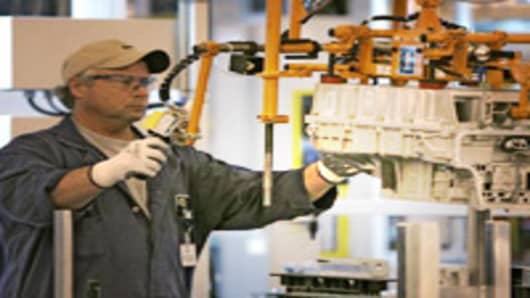A surprise contraction in U.S. manufacturing activity in June has raised the prospects of a worsening slowdown in the U.S., but one economist says the economy may actually be showing signs of bottoming out.
Gary Schlossberg, Chief Economist at Wells Capital Management, told CNBC Asia’s“Squawk Box”on Tuesday a recovery in housing and construction will lend support to the economy for the rest of the year.
Construction spending in the U.S. increased a better-than-expected 0.9 percent in May to an annual rate of $830 billion, the highest level since December 2009, the Commerce Department said on Monday. Economists polled by Reuters had expected construction spending to rise 0.2 percent after a 0.6 percent gain in April.
“I think it’s interesting that the construction spending numbers do point to the fact that this recovery, such that it is, is being led increasingly by housing, which could provide some support to the economy later in the year,” Schlossberg said.
Housing is becoming one of the few bright spots in the U.S. economy, whose recovery has slowed in recent months as the debt crisis in Europe and worries about a “fiscal cliff” of higher taxes and lower spending create a cloud of uncertainty for businesses and households.
That uncertainty is already having an impact in the manufacturing sector. The U.S. Institute for Supply Management’s (ISM) index dropped from 53.5 in May to 49.7 in June, the lowest reading since July 2009. The data, released Monday, surprised analysts who were expecting a slight expansion.
But Schlossberg said lower fuel costs, rising home values, the return of ‘risk-on’ trading in the wake of Europe’s bailout agreement with Spain and Italy, and hopefully, higher consumer spending will boost growth this year.
He pointed out that while the decline in manufacturing was unexpected, the weakness wasn’t across the board. There are still jobs available in some segments of manufacturing and employers are having difficulty filling vacancies, he said.
“This drop-off in orders may have surprised manufacturers as much as it surprised us,” he said. “Clearly, there’s caution on both sides of the ledger. They’re not getting the orders, they’re keeping inventories lean. On the other hand, there is that case that the labor markets may be a little bit tighter in some areas than they appear on the surface.”
The shortage of skilled manufacturing workers in some sectors could be encouraging businesses to hold off on new orders until they get better visibility on the economic outlook, he said.
A number of economists and strategists believe the weakness in the manufacturing sector won’t lead to another recession.
Michael Jones, Chief Investment Officer of Riverfront Investment Group, a U.S.-based asset manager, told CNBC the U.S. economy should improve in the second half of the year, albeit in a "three steps forward, two steps back" manner.
“This second quarter was the maximum period of uncertainty, whether Europe was going to be able to pull a policy rabbit out of their hat,” Jones said. “And you also had, for most of the period, uncomfortably high gasoline prices in the U.S. so the combination of those two forces, add on top of that a little bit of uncertainty over fiscal policy in the U.S. and there are a lot of reasons to curtail your purchases during your quarter.”
- By CNBC's Jean Chua.


